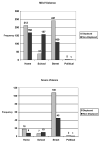Displaced and non-displaced Colombian children's evaluations of moral transgressions, retaliation, and reconciliation
- PMID: 25722543
- PMCID: PMC4338991
- DOI: 10.1111/j.1467-9507.2008.00483.x
Displaced and non-displaced Colombian children's evaluations of moral transgressions, retaliation, and reconciliation
Abstract
In order to assess the effects of displacement and exposure to violence on children's moral reasoning, Colombian children exposed to minimal violence (non-displaced or low-risk) (N = 99) and to extreme violence (displaced or high-risk) (N = 94), evenly divided by gender, at 6-, 9-, and 12 - years of age, were interviewed regarding their evaluation of peer-oriented moral transgressions (hitting and not sharing toys). The vast majority of children evaluated moral transgressions as wrong. Group and age differences were revealed, however, regarding provocation and retaliation. Children who were exposed to violence, in contrast to those with minimum exposure, judged it more legitimate to inflict harm or deny resources when provoked and judged it more okay to retaliate for reasons of retribution. Surprisingly, and somewhat hopefully, all children viewed reconciliation as feasible. The results are informative regarding theories of morality, culture, and the effects of violence on children's social development.
Figures
References
-
- Ardila R. International perspectives on violence. Praeger Publishers/Greenwood Publishing Group; 2004. Violence in Colombia: Social and psychological aspects; pp. 59–67.
-
- Ardila-Rey A, Killen M. Middle-class Colombian children's evaluations of personal, moral and social-conventional interactions in the classroom. International Journal of Behavioural Development. 2001;25:246–255.
-
- Arsenio W, Lemerise E. Aggression and moral development: Integrating the social information processing and moral domain models. Child Development. 2004;75:987–1002. - PubMed
-
- Astor RA. Children's moral reasoning about family and peer violence: The role of provocation and retribution. Child Development. 1994;65:1054–1067.
-
- Astor RA, Behre WJ. Violent and nonviolent children's and parents' reasoning about family and peer violence. Behavioral Disorders. 1997;22:231–245.
Grants and funding
LinkOut - more resources
Full Text Sources

